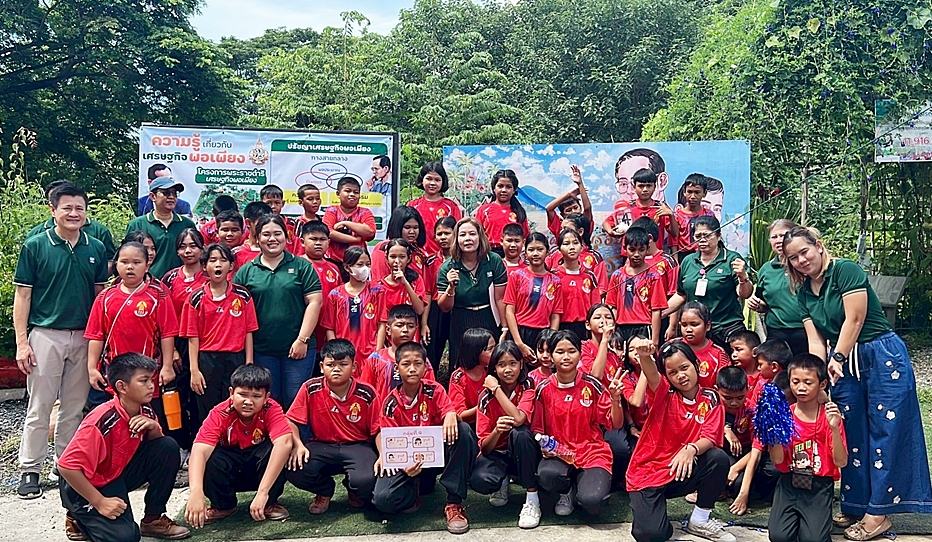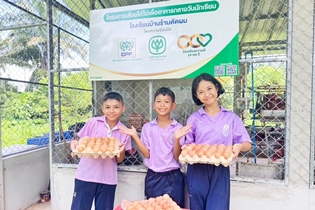

Manufacturing industries are actively moving to become “low-carbon” organizations and adopt “low-carbon” production, as the global community strives to re-adjust natural balances amid climate change and global warming as a result of exploitation of energy and natural resources and inefficient resource management.
The emission of carbon dioxide to atmosphere is inevitable as long as global demand for products, food, services and transportation remains high. Concrete actions are capping CO2 emission through optimized resource and energy management, modernization of machinery, and installation of technology that helps reduce production-related gas emissions.
Charoen Pokphand Foods PLC (CPF) is dedicated to 3 pillars towards sustainable business operations: “Food Security, Self-Sufficient Society and “Balance of Nature”. Adjusting the production process to alleviate environmental impacts supports the pillars and UN Sustainable Development Goals (SDGs) which seek to protect, revitalize, and promote sustainable use of ecosystems as well as eco-efficiency way to mitigate climate change impacts.
Mr. Wuthichai Sithipreedanant, CPF’s senior vice president for corporate social responsibility and sustainable development, said that CPF sets the goal to reduce greenhouse gas emissions by 25% in 2025, from the level in the base year 2015. Under the goal to achieve sustainable business operations and business growth, CPF adopts changes from the base year in both production process and products. Such changes – including power generation from biogas, rooftop solar energy and innovative environmental-friendly swine feed – have reduced CO2 emissions by 522,000 tons on annual average.
Mr. Wuthichai added that CPF also develops green products including products with Thailand Greenhouse Gas Management Organization-certified carbon footprint labels like chicken meat, living chicken and chicks. Carbon footprint labels are being obtained for animal feed, expected to be granted in 2019. Meanwhile, fresh chicken meat and soft chicken breast are assigned water footprint labels under ISO 14046 standard. CPF generated Bt17,764 million from green products (so-called green revenue) in 2018, or 10% of total revenue contributed by the operations in Thailand.
CPF also adopts the “neutral carbon” approach in new socially-responsible sustainability activities, including “Carbon Neutral Event” which allows public participation in an activity that promises low GHG emissions. Under the event, CPF’s accumulated 560 tons CO2e carbon credit in Thailand Voluntary Emission Reduction Program (T-VER) will be used to neutralize the GHG emitted from the activity’s power usage, participants’ travel and camping, food and beverages, as well as any discarded items. The carbon neutral approach is expected to be implemented in 2020.
Under the low-carbon organization goal, CPF has set the goal to reduce water withdrawal per production units by 25% this year (2020) and 30% by 2525 respectively. Moreover, the company also implements modern technology throughout the supply chain to reduce the use of natural water and maximize water utilization.
CPF also received the “Water Scarcity Footprint” label for its raw chicken meat product and tender chicken breast product from the Federation of Thai Industries, as the first company in Thailand to be certified.
Mr. Wuthichai said that CPF has drawn three methods to manage water sustainability, including 1. Water risk-related management, which has been implemented every year under Aqueduct criteria. 2. Water Recycling which recycle treated water will be reused in livestock farms. 3. Treated water from farms and food processing plants will also be released to plant areas around the farms to ease water shortage.
The company has put in place the importance of protecting biodiversity through its initiative project named “CPF Grow – Share – Protect Mangrove Forestation Project” covered 2,388 rais in five coastal provinces including Rayong, Samutsakon, Chumporn, Phang-nga and Songkhla and “CPF Rak Ni-Ves, Pasak Watershed, Khao Phraya Doen Tong Project” in Lopburi covering 5,971 rais. The projects aimed to restore both coastal areas and forest as human and animal’s food sources. They will also help absorb and store pollutants that are emitted from agricultural, industrial and household activities.
CPF is dedicated to continually mitigating global warming impacts through the improvement and installation of technology that supports natural resource optimization in the production process and create minimum environmental impacts, to maintain natural balance and sustainably preserve the nature.







_1752829776.jpg)

